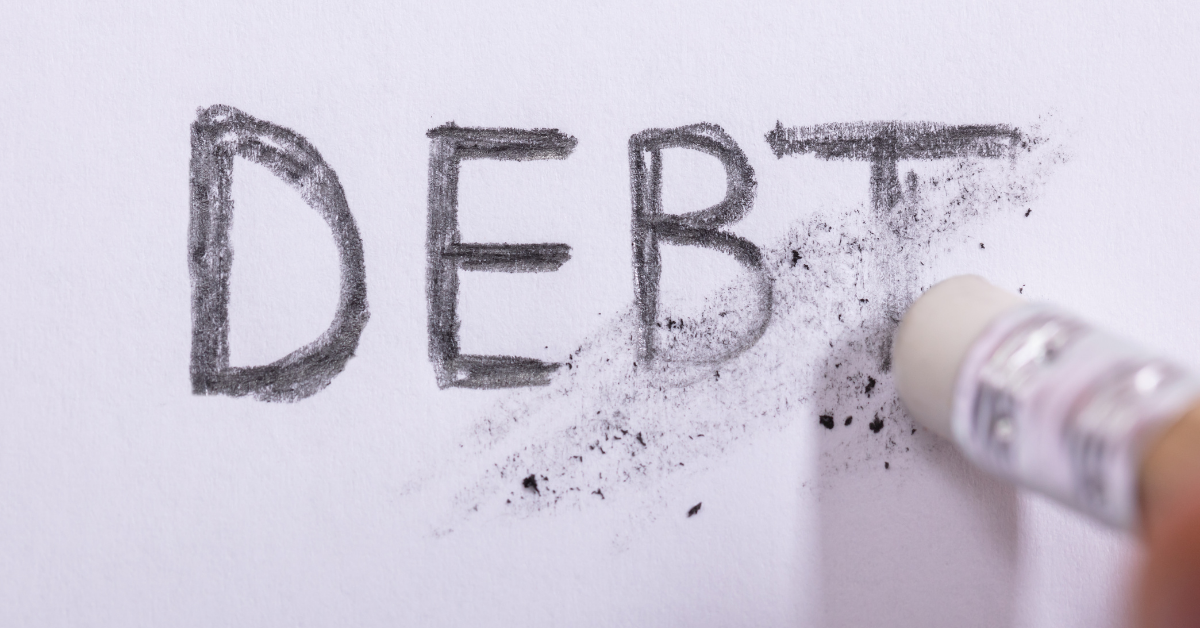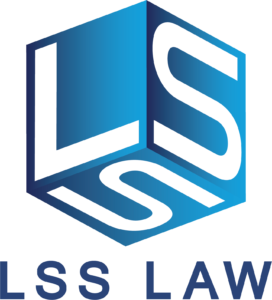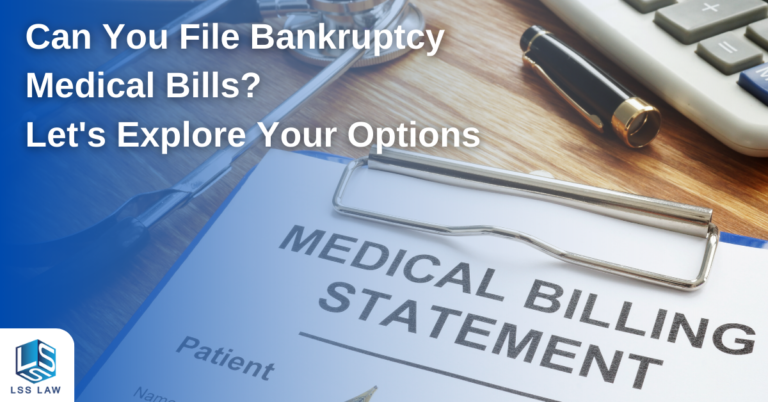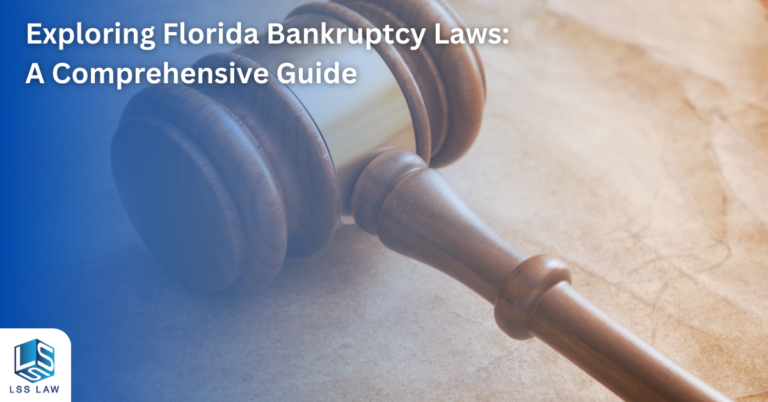Dealing with medical debt can be overwhelming, especially when you’re also trying to recover from health issues. You might be wondering, can you file bankruptcy medical bills? The good news is, yes, you can. Bankruptcy can be a powerful tool to help you eliminate medical debt and regain control of your financial life. In this article, we will discuss the different types of bankruptcy and how they can help you with your medical bills.
All About Filing Bankruptcy for Medical Bills
Medical bankruptcy is not an official legal category, but medical debt can be discharged through regular bankruptcy proceedings. Medical debt is considered non-priority unsecured debt, which means it can be forgiven in bankruptcy, unlike priority debt such as tax bills, child support, and most student loans.
There are two main types of personal bankruptcy that can help you with medical debt: Chapter 7 and Chapter 13. Let’s take a closer look at each of them.
Chapter 7 Bankruptcy: A Fresh Start for Your Medical Debt
Chapter 7 bankruptcy, also known as liquidation bankruptcy, discharges certain types of debt, including medical debt, and can provide immediate relief from other debt collection efforts. This type of bankruptcy takes around 90 to 120 days from filing to debt discharge, giving you a relatively quick fresh start.
However, filing Chapter 7 can result in the loss of property to repay creditors and negatively affects your credit for 10 years. It’s essential to weigh the pros and cons of filing for Chapter 7 and consult with a bankruptcy attorney to determine if it’s the right option for you.
Chapter 13 Bankruptcy: A Structured Plan to Repay Your Medical Bills
Chapter 13 bankruptcy establishes a court-mandated plan to repay debt, including medical bills, in affordable monthly installments. This type of bankruptcy requires a regular source of income and involves a three- to five-year debt repayment plan.
Chapter 13 bankruptcy can be a good option for those who have a steady income and want to keep their property while working towards paying off their medical debt. However, it’s crucial to consult with a bankruptcy attorney to determine if Chapter 13 is the right choice for your situation.
The Benefits of Eliminating Medical Debt Through Bankruptcy

Filing for bankruptcy to eliminate medical debt can provide several benefits. These include:
- Peace of mind: Overwhelming medical debt can cause significant stress and anxiety. By discharging your medical debt through bankruptcy, you can alleviate this burden and focus on rebuilding your financial future.
- Protection from aggressive collection efforts: Once you file for bankruptcy, the automatic stay provision will temporarily halt collection efforts from your medical providers and other creditors. This can provide relief from constant calls and letters demanding payment.
- Improved financial stability: Eliminating medical debt can free up disposable income that can be used to pay off other debts, save for emergencies, or invest in your future. This can help you regain control of your finances and work towards long-term financial goals.
- A fresh start: Bankruptcy can provide a clean slate, allowing you to move forward without the burden of medical debt. With the right financial planning and responsible habits, you can rebuild your credit and work towards a more secure financial future.
Navigating Health Insurance and Medical Treatment After Bankruptcy

After filing for bankruptcy and discharging your medical debt, it’s essential to take steps to prevent future medical debt from accumulating. One way to do this is by ensuring you have adequate health insurance coverage. Review your current insurance plan and consider whether it provides sufficient coverage for your medical needs. If necessary, explore alternative insurance options or seek financial assistance through government programs like Medicaid or the Affordable Care Act.
Additionally, maintain open communication with your medical providers about your financial situation and any concerns you may have about paying for medical treatment. Many medical providers offer payment plans or financial assistance programs for patients who are unable to pay their bills in full. By staying proactive and addressing potential issues before they become overwhelming, you can help prevent future medical debt and maintain your financial stability.
When to Seek Professional Help for Medical Debt and Bankruptcy
If you are struggling with medical debt and considering bankruptcy, it’s crucial to consult with a professional who can help you navigate the process and make informed decisions. A bankruptcy attorney can provide valuable guidance on which type of bankruptcy is best suited for your situation, help you understand the potential impact on your credit report, and represent you in bankruptcy court.
In addition to seeking legal advice, consider working with a credit counselor or financial advisor who can help you create a plan for rebuilding your credit and managing your finances after bankruptcy. By seeking professional help and taking a proactive approach to your financial situation, you can work towards a brighter financial future free from the burden of medical debt.
The Bankruptcy Means Test and Medical Debt
When considering filing for bankruptcy, it’s important to understand the means test and how it relates to your medical debt. The means test is a formula used to determine if you qualify for Chapter 7 bankruptcy or if you must file for Chapter 13 instead. The test compares your monthly income to the state’s median income for a household of your size and calculates your disposable income after accounting for necessary living expenses.
Medical debt is considered unsecured debt and can be discharged in both Chapter 7 and Chapter 13 bankruptcy. However, the means test may impact which type of bankruptcy you are eligible for. If your income is below the state’s median income and you have little or no disposable income, you may qualify for Chapter 7 bankruptcy. If your income is above the median and you have sufficient disposable income, you may be required to file for Chapter 13 and establish a repayment plan for your medical debt and other debts.
It’s essential to consult with a bankruptcy attorney to help you navigate the means test and determine the best course of action for your unique financial situation.
Medical Debt and Insurance Coverage
One way to prevent overwhelming medical debt is to ensure that you have adequate health insurance coverage. While insurance may not cover all of your medical expenses, it can significantly reduce the amount you owe to medical providers. Here are some tips for maximizing your insurance coverage and minimizing your medical debt:
- Understand your insurance plan: Review your health insurance policy to understand what services are covered, what your copayments and deductibles are, and if there are any limitations or exclusions. Knowing your coverage can help you make informed decisions about your medical care and avoid unexpected bills.
- Stay in-network: Whenever possible, choose medical providers that are in your insurance plan’s network. In-network providers have negotiated lower rates with your insurance company, which can result in lower out-of-pocket costs for you.
- Ask about financial assistance: If you are uninsured or underinsured, ask your medical provider if they offer financial assistance or payment plans. Many providers are willing to work with patients to make their medical bills more manageable.
- Consider supplemental insurance: Depending on your specific health needs, you may want to consider purchasing supplemental insurance, such as dental, vision, or long-term care coverage. These policies can help cover costs that your primary health insurance may not cover.
By staying proactive with your insurance coverage and engaging in open communication with your medical providers, you can minimize the risk of accumulating unmanageable medical debt.
FAQ: Can You File Bankruptcy Medical Bills
Can I discharge all types of medical debt in bankruptcy?
Yes, medical debt is considered unsecured debt and can be discharged in both Chapter 7 and Chapter 13 bankruptcy. However, some debts, such as child support, alimony, and most student loans, cannot be discharged through bankruptcy.
How long does it take to complete a bankruptcy case for medical debt?
The timeline for completing a bankruptcy case varies depending on the type of bankruptcy filed. Chapter 7 bankruptcy typically takes around 90 to 120 days from filing to debt discharge, while Chapter 13 bankruptcy requires a three- to five-year debt repayment plan.
Will filing bankruptcy for medical bills affect my credit score?
Yes, filing for bankruptcy will negatively impact your credit score. However, with responsible financial management and following the correct recommendations, most people can rebuild their credit over time. A Chapter 7 bankruptcy remains on your credit report for up to ten years, while a Chapter 13 bankruptcy remains for up to seven years.
Can I keep my house and car if I file bankruptcy for medical bills?
In Chapter 7 bankruptcy, you may be able to keep your house and car if they are protected under Florida’s bankruptcy exemptions, such as the homestead exemption and motor vehicle exemption. In Chapter 13 bankruptcy, you can keep your assets as long as you continue making payments under the court-approved repayment plan.
What is the difference between secured and unsecured debt?
Secured debt is backed by collateral, such as a mortgage or car loan. If you default on a secured debt, the creditor can seize the collateral to recover their losses. Unsecured debt, like medical bills and credit card debt, is not backed by collateral, making it easier to discharge in bankruptcy.
Can I negotiate with my medical providers to lower my medical bills?
Yes, it’s possible to negotiate with your medical providers to lower your medical bills. You can request itemized bills, review them for errors, and discuss payment plans or financial assistance programs with your provider.
Contact Us to Learn More About Filing Bankruptcy for Medical Bills

If you’re struggling with medical debt and considering bankruptcy, it’s essential to consult with an experienced bankruptcy attorney who can guide you through the process. At LSS Law, we’re committed to helping people just like you remove the financial burden of medical debt and open the door to a brighter future. Schedule your free consultation for personal bankruptcy (Chapters 7 and 13) by calling us at (954) 466-0541 or visiting our contact page. Let us help you navigate your options and find the best solution for your unique financial situation.





